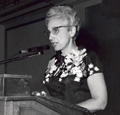Estelle Brodman
| Interviewers: |
Audrey K. Berteau, Loretta Stucki, Barbara Halbrook, Betty Kulifay, Millard Johnson |
 |
| Date: |
November 22, 1978 |
| Identifier: |
OH039 |
| Approximate Length: |
17 leaves |
| Biographical Information: |
Medical librarian (1914-2007). Assistant librarian for reference service at the National Library of Medicine, 1949-1961. Library director and professor of Medical History, Washington University School of Medicine, 1961-1981. Editor of the Bulletin of the Medical Library Association, 1947-1957; president of the Medical Library Association, 1964-1965. |
| Summary: |
Dr. Brodman explains her pursuit of a degree in Library Science, her two years at Columbia University, and her early career in the Medical Library Association. Dr. Brodman then discusses her career at the National Library of Medicine and the differences between the Army Medical Library of the 1940s and the National Library of Medicine of the 1970s. She mentions the development of MEDLARS and GRACE and the demise of the Index Catalog. Dr. Brodman tells of coming to Washington University School of Medicine Library and changes in libraries over the decades. The several interviewers next respond to Dr. Brodman’s questions about the changes in the Washington University School of Medicine Library. The interview ends with Estelle Brodman’s statement on how fulfilling and exciting medical librarianship has been for her. |
| Notes: |
Dr. Brodman was interviewed in 1978 by several library staff members. The original transcript identifies the interviewers as “Mrs. Bertell and Others.” The identification of Mrs. Bertell was probably a transcription error as there is no record of a “Mrs. Bertell” on the Medical Library staff at that time. However, rosters of the staff suggest that “Mrs. Bertell” was actually Audrey K. Berteau, who served as head of public services from 1977-1979. Mrs. Berteau was the first interviewer. Where the interviewer is unknown, "INT" has been used. |
Please note: The Becker Medical Library presents this oral history interview as part of the record of the past. This primary historical resource may reflect the attitudes, perspectives, and beliefs of different times and of the interviewee. The Becker Medical Library does not endorse the views expressed in this interview, which may contain materials offensive to some users.
|

